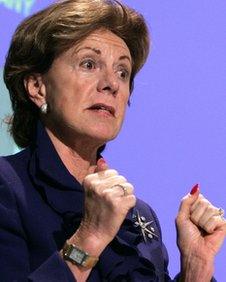Do Not Track standard needs action says commissioner
- Published

European commissioner Neelie Kroes has accused members of the online industry of watering down a standard designed to protect consumers' privacy on the web.
Websites are under pressure to allow consumers much greater control over how they are tracked online.
But work undertaken by the World Wide Web Consortium (W3C) to create a Do Not Track (DNT) standard was "not going to plan", said Ms Kroes.
She is angry about delays and a proposal to exempt marketing.
Very clear
In a speech at the Centre for European Policy Studies in Brussels, Ms Kroes, vice president for the digital agenda commission, said: "I said it in January, loud and clear. But, for the avoidance of doubt, I will say it again today, the DNT standard must be rich and meaningful enough to make a difference when it comes to protecting people's privacy."
She praised browser manufacturers who had incorporated DNT technology but said that it was not enough.
"Standardisation work is not going according to plan. In fact, I am increasingly concerned," she said.
"It should be built on the principle of informed consent, giving people control over their information. And, indeed, it must be designed to let people choose not to be tracked. The clue is in the name - do not track,"
She is concerned by suggestions that DNT might not be set as a default.
"The commission services were very clear on this point in their letter to the W3C - at installation or first use, users must be informed about the importance of their DNT choice," she said.
She is also angry about the "extremely broad" exceptions now being suggested to the W3C, exemptions that have been described by the Federal Trade Commission's chairman Jon Leibowitz as "a loophole you could drive a virtual truck through".
Much of the anger is reserved for the Direct Marketing Association (DMA), which has asked the W3C that marketing be added to the list of those activities exempt from the standard.
In an email exchange published by technology news website ZDNet, the DMA representative said: "Marketing fuels the world. It is as American as apple pie and delivers relevant advertising to consumers about product they will be interested in at a time they will be interested. DNT should permit it as one of the most important values of civil society."
Ms Kroes had a stark warning for US companies.
"If you want to track Europeans, you have to play by our rules," she said.
Open Rights Group chairman Jim Killock thinks that the advertising industry is shooting itself in the foot.
"They are hoping it will go away but all they are doing is aggravating people like Neelie Kroes and pushing them towards legislation," he said.
"The Federal Trade Commission and the European Commission are demanding this happen, there is a lot of political authority behind it because it is not reasonable that people are tracked without their consent," he added.
Cookie crackdown
Much online tracking happens via cookies, small files that are used to recognise consumers when they revisit a site and to track activity across the web.
European laws that define how cookies are used came into force on 26 May.
It requires websites to explain what cookies are and to get users' permission before using them.
In the UK, the Information Commissioner's Office (ICO) recently said that it would launch a crackdown on those not complying.
According to research firm KPMG, it could affect up to 65% of UK companies, including Tesco, Sainsbury, the Daily Mail and even government department such as the Department for Work and Pensions.
They could face fines of up to £500,000 each.
The ICO said it had received 486 complaints about non-compliance since May.
- Published10 July 2012
- Published6 September 2012
- Published26 May 2012